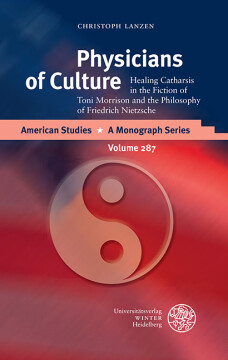
BUCH
Physicians of Culture
Healing Catharsis in the Fiction of Toni Morrison and the Philosophy of Friedrich Nietzsche
American Studies – A Monograph Series, Bd. 287
2018
Zusätzliche Informationen
Bibliografische Daten
Abstract
Insbesondere die Romantrilogie ‚Beloved, Jazz‘ und ‚Paradise‘ der amerikanischen Literaturnobelpreisträgerin Toni Morrison wird als Höhepunkt ihrer innovativen Erzählkunst gesehen und ist vielfältig interpretiert worden. Die vorliegende Studie fügt den Deutungen eine genuin transnationale Lesart hinzu. So untersucht die Arbeit Morrisons philosophisches Interesse an der griechischen Tragödie und dem Katharsis-Konzept. Ausgehend von Nietzsche entwickelt die Studie anhand grundlegender Theoreme von Freud, Hegel und Marx die Grundlagen einer tragischen Wissenskultur, welche mit der Philosophie von W.E.B. DuBois und Henry Louis Gates Jr. und den Ideen der ‚double consciousness‘ sowie des ‚doctors of interpretation‘ verbunden werden. Morrisons Trilogie wird als prophetische Schrift dieser tragischen Wissenskultur vorgestellt, in der die notwendigen, aber illusorischen Kategorien, Ordnungen, Hierarchien und Kontrollfantasien des Apollinischen immer wieder durch die Dekonstruktion des Dionysischen hinterfragt und in Bewegung gebracht werden.
Inhaltsverzeichnis
| Zwischenüberschrift | Seite | Aktion | Preis |
|---|---|---|---|
| Cover | Cover | ||
| Titel | 3 | ||
| Imprint | 4 | ||
| Preface | 7 | ||
| Table of Contents | 11 | ||
| 1 Introduction: Physicians of Culture | 13 | ||
| 2 Tragic Interventions | 43 | ||
| 2.1 Friedrich Nietzsche’s Tragic Therapy | 43 | ||
| 2.2 Black Doctors of Interpretation | 53 | ||
| 2.2.1 W.E.B. Du Bois’s "Double Consciousness" | 53 | ||
| 2.2.2 Henry Louis Gates’s "Therapeutic Trickster" | 56 | ||
| 2.3 Tragedy’s Healing Aesthetics | 59 | ||
| 3 Beloved as Tragedy | 63 | ||
| 3.1 Introduction: The Genre and the Text | 63 | ||
| 3.1.1 Aristotelean Principle | 65 | ||
| 3.1.2 Aristotelean Principle | 67 | ||
| 3.1.3 Aristotelean Principle | 68 | ||
| 3.2 Introduction: The Curing Catharsis of "Beloved" | 78 | ||
| 3.2.1 Strategy | 83 | ||
| 3.2.2 Strategy | 86 | ||
| 3.2.3 Strategy | 89 | ||
| 3.2.4 Strategy | 91 | ||
| 3.2.5 Reading Paul D’s Healthcare | 92 | ||
| 3.3 Conclusion: Mythological Foundations | 94 | ||
| 4 Jazz: Free at Last! Free at Last | 97 | ||
| 4.1 Escaping the Brutal South | 102 | ||
| 4.2 The Harlem Renaissance: Liberty and Reinvention | 106 | ||
| 4.2.1 The City of Dreams | 108 | ||
| 4.2.2 The Liberty of Jazz-music | 110 | ||
| 4.3 When You Gaze Into An Abyss, The Abyss also Gazes into You | 110 | ||
| 4.3.1 Of Nihilism and Jazz-music | 111 | ||
| 4.3.2 Gotham | 113 | ||
| 4.3.3 Hey Joe: Where you Going with That Gun in Your Hand? | 114 | ||
| 4.3.3.1 Joe’s Education: Never kill the Tender | 116 | ||
| 4.3.3.2 Joe’s Fall from Grace | 118 | ||
| 4.3.3.3 There Must Be Some Kind of Way Outta Here | 121 | ||
| 4.4 Conclusion: If You Play With Fire, You Get Burned | 123 | ||
| 5 Paradise: Of Hybris and Sublation | 125 | ||
| 5.1 Introduction: Double Voiced Geography | 125 | ||
| 5.2 The Convent: Paradise Regained | 129 | ||
| 5.2.1 Black Female Physicians of Culture | 130 | ||
| 5.2.2 Black Physicians in Context | 133 | ||
| 5.2.3 The Female Revival of a Therapeutic Legacy | 134 | ||
| 5.4 Ruby: Paradise Lost | 135 | ||
| 5.4.1 The Waste Land: Of Hybris and Infanticide | 136 | ||
| 5.4.2 A Healing Wisdom Lost: The Therapeutic Intervention of the Oven | 140 | ||
| 5.5 Conclusion: Playing in the Sand | 145 | ||
| 6 Conclusion: The Birth of Physicians from the Spirit of Tragedy | 149 | ||
| 7 Bibliography | 159 | ||
| Backcover | 173 |


 Publishing Platform by CloudPublish
Publishing Platform by CloudPublish